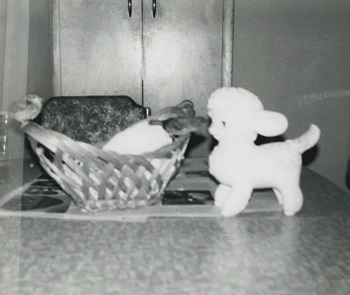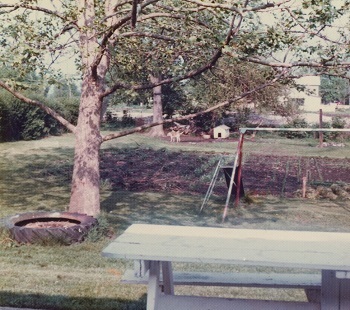Family Proudly Graduates Young Birds
Our family just raised two English sparrows and sent them back to their own environment. This is probably not remarkable, except to us. Many people every year save orphan birds from starvation. I hope they are just as proud and excited as my six children were of their accomplishment.

Two of the girls brought in the downy, partly-bare babies cuddled in their hands on a very cool evening in June. The birds looked alert and healthy. We guessed they might be one week old. The girls said they found them near the baseball field and there was no sign of a nest or another bird around. We settled them in a breadbasket on a piece of towel and covered them loosely with another cloth, simulating their mother, we hoped.
I was doubtful about the whole thing, since we had tried to raise birds once before and they died. I had read somewhere that baby birds need to eat every half hour. That would keep the whole family of us digging worms all day, considering our fishermen's reports of their scarcity. So we ruled out worms.
In the morning the birds were cheeping cheerfully, too cheerfully. Their mouths were wide open and upturned, a shocking prospect to face before morning coffee. I realized, thankfully, though, that they were not going to be hungry in the dark—not quite as difficult as a human baby with a 2 a.m. feeding. I hurriedly mixed some one-minute oatmeal with warm milk, and with tweezers as my beak, shut them up before they awoke everyone. We soon learned to keep a saucer with the oatmeal or bread and milk nearby so that when the cheeping renewed, the nearest person could drop a morsel down their throats.
We also gave them raw hamburger, in lieu of worms. This supplied their protein, I suppose. It wasn't enough to ruin the meat budget, because I don't think they ate enough for two hamburger patties in their whole childhood or birdhood.
An ornithologist might be appalled at their diet, but I feel it must have been all right despite our ignorance because they began to grow daily. The down covered all of the bare spots, and the wing and tail feathers were just a fraction longer each day.
We began to notice a difference between them—personality or sex, we didn't know. One was slimmer and cheeped more. The other was shy and fluffier. In a few days they began fluttering their wings with every bite they were offered, as if they were beside themselves with joy.
The children began asking unanswerable questions. For instance, "How are we going to teach them to fly?" There were various ideas suggested, such as jumping off the roof in front of them, flapping our arms. Or, "Why are you feeding them people food? How would you like to be fed bugs and worms by a mother bird if you were an orphan?" I didn't dignify that with a comment.
Then the birds began to fly without flight lessons. They took short jaunts from one end of their basket to the other, then finally down to the table. They also took imaginary dust baths in washcloths, towels, or any article of clothing left near them.
Now our oldest daughter started worrying about how they were going to feed themselves when we let them loose. They showed no inclination to peck at food. Their mouths just popped open whenever anyone passed close by. So she set them down by the saucer and taught them to peck. It's rather hard to explain how when she can't peck herself.
Now the birds were taking longer flights, down to the floor or from their basket to someone's head. The younger children couldn't resist this phase and were playing with them most of the time. The birds seemed to thrive despite being carried around on shoulders, heads, and outstretched fingers.
The basket was moved to another room onto the top of a high cabinet so the birds could have some peace, and they adjusted to the new location immediately. When brought back to the first room, they could fly straight back up to their basket. In fact they were very fond of their basket. When we decided to give them a look at the outside world, we took them out in the basket and put it on the picnic table.
We could almost see their thoughts as they tilted their heads and looked up at the tree branches. Another bird chirped and our birds' heads shot up. Their eyes were alert and full of wonder. A little black bug flew by and one sparrow swiveled around and grabbed half of it. So we stopped worrying about how they would know their kind of food.

They decided to fly, one into a sycamore tree, the other into the crabapple tree. They clung where they landed and seemed afraid to move. Finally one flew to the other and they were both in the crabapple. But we realized our mistake in letting them try their wings then. It had rained heavily and with the wet leaves the birds were both soaked. Also, it was almost dark and it was supposed to be a very cool night. I had visions of our poor birds with pneumonia.
It took our tallest person with the tallest ladder to get our delicate birds out of that flimsy tree. We were all soaked and the tallest person, "Daddy," was in a bad mood.
On a perfect, dry day we decided to take them out to stay. The basket would remain on the picnic table for home base. They stayed close to it, then took short flights back and forth over the roof and yard. For two days, they landed on our heads or arms whenever we came near. At night the basket was tied to the low branch of the sycamore tree, and they slept in it. We spotted them on the housetop or antenna, still together, for several more days, but they were losing their tameness. We were glad because we doubted they could live long if they showed too much interest in humans.
Now, after two weeks, we don't really know which sparrows are ours out of a yardful, but we are wondering if someday we are going to see bird nests that look like breadbaskets.





